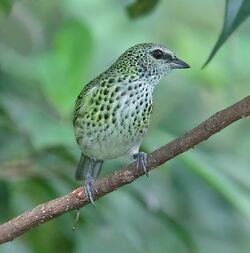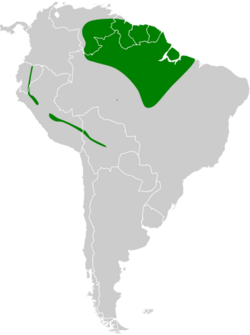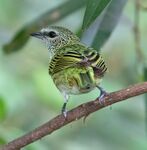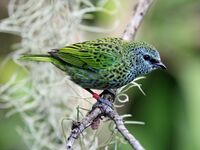Biology:Spotted tanager
| Spotted tanager | |
|---|---|

| |
| Scientific classification Error creating thumbnail: Unable to save thumbnail to destination
| |
| Domain: | Eukaryota |
| Kingdom: | Animalia |
| Phylum: | Chordata |
| Class: | Aves |
| Order: | Passeriformes |
| Family: | Thraupidae |
| Genus: | Ixothraupis |
| Species: | I. punctata
|
| Binomial name | |
| Ixothraupis punctata (Linnaeus, 1766)
| |

| |
| Synonyms | |
|
Tanagra punctata Linnaeus, 1766 | |
The spotted tanager (Ixothraupis punctata) is a species of bird in the tanager family Thraupidae. It is found in Bolivia, Brazil , Ecuador, French Guiana, Guyana, Peru, Suriname, and Venezuela. Its natural habitats are subtropical or tropical moist lowland forests and subtropical or tropical moist montane forests.
Taxonomy
In 1760 the French zoologist Mathurin Jacques Brisson included a description of the spotted tanager in his Ornithologie based on a specimen collected in the West Indies. He used the French name Le tangara verd piqueté des Indes and the Latin name Tangara viridis indica punctulata.[1] Although Brisson coined Latin names, these do not conform to the binomial system and are not recognised by the International Commission on Zoological Nomenclature.[2] When in 1766 the Swedish naturalist Carl Linnaeus updated his Systema Naturae for the twelfth edition he added 240 species that had been previously described by Brisson.[2] One of these was the spotted tanager. Linnaeus included a terse description, coined the binomial name Tanagra punctata and cited Brisson's work.[3] The specific name punctata is Latin for "spotted".[4] The spotted tanager is now placed in the genus Ixothraupis.[5]
Five subspecies are recognised:[5]
- I. p. punctata (Linnaeus, 1766) – south Venezuela, the Guianas and north Brazil
- I. p. zamorae (Chapman, 1925) – central Ecuador and north Peru
- I. p. perenensis (Chapman, 1925) – central Peru
- I. p. annectens (Zimmer, JT, 1943) – southeast Peru
- I. p. punctulata (Sclater, PL & Salvin, 1876) – west-central Bolivia
Gallery
References
- ↑ Brisson, Mathurin Jacques (1760) (in French, Latin). Ornithologie, ou, Méthode contenant la division des oiseaux en ordres, sections, genres, especes & leurs variétés. 3. Paris: Jean-Baptiste Bauche. pp. 19–20, Plate 4 fig 2. https://biodiversitylibrary.org/page/35953012. The two stars (**) at the start of the paragraph indicates that Brisson based his description on the examination of a specimen.
- ↑ 2.0 2.1 Allen, J.A. (1910). "Collation of Brisson's genera of birds with those of Linnaeus". Bulletin of the American Museum of Natural History 28: 317–335.
- ↑ Linnaeus, Carl (1766) (in Latin). Systema naturae : per regna tria natura, secundum classes, ordines, genera, species, cum characteribus, differentiis, synonymis, locis. 1, Part 1 (12th ed.). Holmiae (Stockholm): Laurentii Salvii. p. 316. https://biodiversitylibrary.org/page/42946512.
- ↑ Jobling, J.A. (2018). "Key to Scientific Names in Ornithology". in del Hoyo, J.; Elliott, A.; Sargatal, J. et al.. Handbook of the Birds of the World Alive. Lynx Edicions. https://www.hbw.com/dictionary/key-to-scientific-names-in-ornithology?name=punctata.
- ↑ 5.0 5.1 Gill, Frank; Donsker, David; Rasmussen, Pamela, eds (July 2020). "Tanagers and allies". IOC World Bird List Version 10.2. International Ornithologists' Union. https://www.worldbirdnames.org/bow/tanagers/.
Wikidata ☰ Q918311 entry
 |




